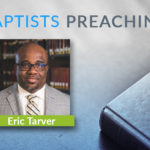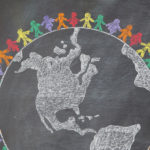Fort Bliss, a U.S. Army base near El Paso, is one of a handful of military installations in the United States that already has received Afghan refugees fleeing their home country after it fell to the Taliban.
According to a member of a refugee advocacy organization, these “refugees could be at Fort Bliss or other similar facilities for up to a year as their cases are processed.”
During that time, plenty of attention will be given to what should be done with Afghan refugees, if they should be resettled and where, what conditions they are living in at Fort Bliss and elsewhere.
We, the church, should not get so lost in these discussions that we fail to examine how Afghan refugees will fare when they come to live with us and maybe even worship with us—perhaps sooner than we think.
Taking a look at ourselves
Let’s assume a large number of Afghan refugees are resettled in the United States. What will their lives be like here? We might look to Vietnamese Americans to answer that question. What has been the experience of Vietnamese Americans in this country? If we don’t know the answer to that question, we ought to find out.
What if we narrow the scope of the first question and ask what the lives of Afghan refugees will be like in our communities? This is where we begin to find out if we know anything concrete about people who “aren’t from around here.”
Looking again to Vietnamese Americans: People from Vietnam may live in our neighborhood, but do we know anything about them—their language, their customs, their faith, their families, their hopes and dreams, their hurts and joys? Or are they something vague in our minds—“boat people,” perhaps?
But even narrowing to the community level leaves many variables outside our control. We might think well of people from other countries and treat them well. But how much can we, as the nice individuals we are, affect how other people treat them? What can we do about their experience finding housing and jobs, enrolling their children in schools, and generally living life in America?
If that’s the question we’re asking, we’re asking the wrong question. It’s not a matter of “can,” but of “will.”
Sign up for our weekly edition and get all our headlines in your inbox on Thursdays
Let’s get closer still. What if we narrow the focus even further to our church? How would an Afghan refugee fare in our church?
To answer that question, we probably don’t have to look as far as the nearest Vietnamese American. You and I can answer that question by how visitors to our church fared last Sunday. So, how did visitors fare at our church last Sunday?
Did we side-eye them or regard them with suspicion? Did we speak to them? And if we spoke to them, was it an interrogation? Did we move to sit by them or invite them to sit by us? Did we breathe a sigh of relief when they left? Did we notice them or think about them at all?
It is easy for most of us to be friendly toward people who dress like us, look like us, talk like us, smell like us. But change any one of those variables, and we might extend our greeting more cautiously. Change all of them at once, and we might lose our religion.
 If a person in Afghan clothing—such as in the picture here—walked into our sanctuary, would we offer him the seat next to us? And would we keep our seat next to him? Would we speak to him? Would we smile at him, shake his hand—if such a gesture were appropriate? Would we offer lunch, which is culturally significant? Would we even know how Afghans regard hospitality or the absence of it?
If a person in Afghan clothing—such as in the picture here—walked into our sanctuary, would we offer him the seat next to us? And would we keep our seat next to him? Would we speak to him? Would we smile at him, shake his hand—if such a gesture were appropriate? Would we offer lunch, which is culturally significant? Would we even know how Afghans regard hospitality or the absence of it?
Maybe we’re not sure what we would do. After all, who’s to know how we will behave tomorrow? A good indicator is how we behaved yesterday. It’s not a fail-safe measure—the past—but how we treated “strangers” at church last Sunday can give us a measure of how we might treat “strangers” at church next Sunday.
Where the rubber meets the road
Perhaps this exercise seems theoretical. For one thing, so much is up in the air right now. The evacuation is still happening; policy is still forming. We don’t know yet what the outcome will be for Afghan refugees brought to the United States.
The exercise rests on three certainties, however, that are far from theoretical: (1) the Bible is clear about how the people of God are to treat “foreigners” or “strangers” in their midst; (2) the church is the people of God—a body, not a building—and lives its life in public, not behind four walls; and (3) God will bring “foreigners” and “strangers” to the church. How will they fare among us?
Regardless of the circumstances leading refugees to reside among us, our task is to be obedient to what we know God expects of the church. The church is given clear instruction on how we are to regard “foreigners” and “strangers.” They are, in a word, our neighbors. And surely we know what Jesus said about our neighbors.
Therefore, when the life of the church—our life—intersects with the life of anyone who isn’t “from around here,” the question before us is not how would they fare, but how should they fare among us?
Eric Black is the executive director, publisher and editor of the Baptist Standard. He can be reached at eric.black@baptiststandard.com or on Twitter at @EricBlackBSP.
















We seek to connect God’s story and God’s people around the world. To learn more about God’s story, click here.
Send comments and feedback to Eric Black, our editor. For comments to be published, please specify “letter to the editor.” Maximum length for publication is 300 words.